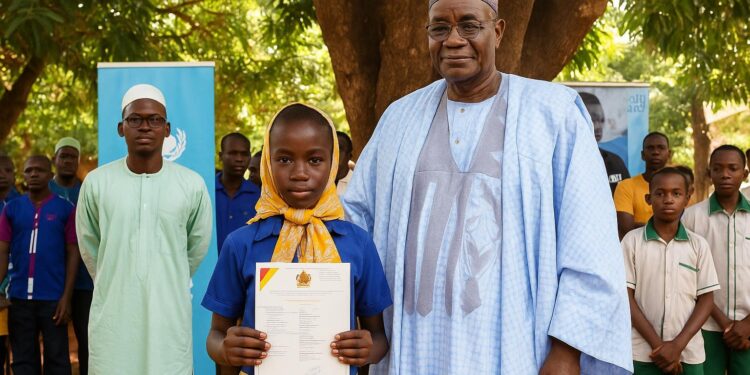Diplomatic urgency around vital statistics
On 10 August, as flags rose over ministries in Brazzaville, Yaoundé and N’Djamena, Central African diplomats marked the African Civil Registration Day with a renewed pledge: no child left uncounted. The spotlight, once dim, now frames civil status as a cornerstone of sovereignty and social cohesion.
That narrative is strongly pushed by the International Organisation of La Francophonie, whose Central Africa office has elevated birth registration from bureaucratic afterthought to development diplomacy. Officials argue that a modern registry not only underpins elections and immunisation drives but strengthens regional stability by curbing trafficking and statelessness.
OIF roadmap and SDG 16.9 synergy
OIF strategists link their programme to Sustainable Development Goal 16.9, the promise of legal identity for all by 2030. ‘Without a certificate, you barely exist in the eyes of the state,’ notes REPAC director Hermés Nandi, calling registration ‘the first passport to opportunity’ (OIF communiqué, 2023).
The roadmap they drafted in 2019 sets two prongs: create inclusive, tech-ready systems; and rally high-level advocacy that places civil status files on cabinet agendas. UNICEF data suggest only 57 percent of births in Central Africa are currently registered, indicating both a large gap and considerable momentum (UNICEF 2022).
From declarations to desks in rural villages
Early results underline that momentum. In Chad’s provinces of Tandjilé and Ennedi-Est, mobile brigades backed by REPAC have issued more than 53,000 birth certificates in less than two years. Local chiefs report that vaccination coverage rose in tandem, as parents discovered the utility of official paper trails.
Across the border in Cameroon’s Far North, where conflict and displacement fray administrative routines, over 5,400 children now hold laminated certificates recognised in all ten regions. ‘The card shields them from forced recruitment,’ a governor’s adviser explains, adding that documentation eases school transfers for families fleeing Boko Haram violence.
Congo-Brazzaville’s quiet progress
Congo-Brazzaville, seldom highlighted in donor briefs, has quietly digitalised registries in Brazzaville and Pointe-Noire and plans rural rollouts with OIF expertise. Officials credit President Denis Sassou Nguesso’s 2021–2026 development blueprint, which singles out civil status as an enabler of social protection and streamlined electoral rolls.
Ministry technicians in Oyo recently piloted solar-powered tablets that upload birth data directly to a central server in Brazzaville, cutting registration time from weeks to hours. The system, adapted from Beninese code, could eventually integrate biometric identifiers, an option being studied with the African Development Bank (AfDB 2023).
Funding, tech and the francophone factor
Financing remains the programme’s hardest variable. OIF seed grants rarely exceed one million euros per country. Brazzaville diplomats now court blended finance, pairing sovereign loans, diaspora remittances and mobile-operator levies. World Bank analysts caution that recurrent costs—ink, connectivity, salaries—can eclipse initial hardware within three budget cycles (World Bank 2023).
Technology choices can also strain interoperability. Some municipalities store PDFs on local laptops; others test cloud-based ledgers powered by Estonian software. OIF engineers propose an open-source middleware to stitch archives together, but privacy regulators insist that any data mirror hosted abroad must reside in jurisdictions with strong personal-data safeguards.
Security, mobility and regional knock-on effects
Security implications, meanwhile, run deeper than databases. In border zones where names cross frontiers, reliable registers help immigration officers separate seasonal traders from smugglers. The Economic Community of Central African States is exploring a shared verification portal, potentially reducing detention times at the busy Louvakou and Kousseri crossings.
Mobility inside cities could benefit as well. Congolese municipalities plan to merge civil status numbers with bus pass chips, simplifying fare subsidies for students and pensioners. ‘A single secure identifier reduces leakage,’ says economist Thérèse Dihoulou, noting that Pointe-Noire’s pilot slashed duplicate claims at public canteens by half.
Voices from the field and the chancelleries
Field workers voice more immediate aspirations. ‘Parents celebrate visibly; they know their child can sit exams,’ recounts nurse Jocelyne Bidounga, who doubles as registrar during outreach caravans. Her team ferries forms by motorcycle across flooded tracks, a logistical feat that underscores the human dimension of spreadsheets.
Diplomatic circles echo that sentiment. A senior French envoy describes civil registration as ‘soft power with concrete impact’, while a Gabonese counterpart urges framing the agenda in pan-African rather than donor language. ‘Once heads of state own the narrative, budgets follow,’ she remarks during a closed briefing in Libreville.
Next milestones toward 2030
Looking ahead, OIF plans to double the number of supported Central African districts by 2025 and publish an annual civil-status index that grades accessibility, data quality and gender parity. The index, under development with Paris-based think tank ID4D, could steer investors toward provinces showing swift administrative returns.
African Civil Registration Day will return next August, yet diplomats insist the countdown is permanent. Success, they contend, will be measured not by speeches but by the moment a rural midwife hands a newborn’s mother a small printed document symbolising equal citizenship in an increasingly connected region.












































